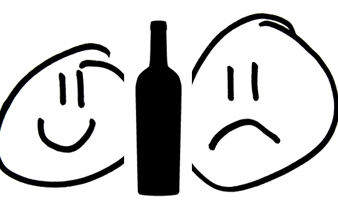Wine, Price, Value and Feeeeelings
 I was told today that the wines of one my Wark Communications winery clients was “overpriced”. The person who told me this was wrong. It’s not that the wine was overpriced. It was that the wine cost more than they were willing to pay.
I was told today that the wines of one my Wark Communications winery clients was “overpriced”. The person who told me this was wrong. It’s not that the wine was overpriced. It was that the wine cost more than they were willing to pay.
I want to explain this.
A wine is priced correctly when the seller of the wine can find enough buyers at the stated price to sell out the inventory before the next vintage of the same wine is released. That doesn’t mean that everyone who wants to buy a wine has to be able to afford said wine. It doesn’t mean that everyone in the market for a bottle of wine thinks the wine in question is a good value or even fairly priced.
It only means that there are enough people in the market for a bottle of wine who will pay the stated priced for the wine in question such that the inventory is vacated before the next vintage is released for sale.
In the wine world, supply and demand is the arbiter of value. So, for a person to tell me that this $140 Cabernet is overpriced, I’d ask why in the world should the winery sell it for a dime less than that if that’s what the market will bear? So that a wider swath of people can afford it? What’s the point in that. There is still a finite amount (and the same amount) of the wine available to buy. No matter what the price, the same number of people will not be able to acquire it.
More importantly, it’s absolutely true that a winery selling a 1,000 bottles of wine at $100 per bottle enhance the value of their other wines that cost less. They do so not by doing anything different with those other, less expensive wines, but by merely selling them under the same label as the wine that sells for $100 per bottle.
In the end the point is that the real value of a wine isn’t a personal thing. It’s illegitimate for someone to state that a particular wine is a bad value at $100 per bottle, as though the statement is objective. The most that can be accurately said is that “$100 is more than I’m willing to pay for this bottle of wine.”
But then this is where it gets very interesting, isn’t it. What determines the perceived value of a wine such that one person would be willing to pay $100 for it while another couldn’t justify paying more than $10?
The wine represents for me the best of its type and I want to experience such things.
The wine gives me warm and fuzzy feelings because I associate it with an important moment in my life.
Acquiring the wine puts me in league with a very small number of other people I admire.
The wine ranks among the most delightful things I’ve ever put in my mouth
The wine guarantees me pleasure without having to wonder if I’ll like it and that kind of simple convenience is important to me.
If other people know I buy this wine, they will likely think more of me.
This is only the start of the many ways in which a person can justify paying 10 times more for a bottle of wine than another person would be willing to spend. The key for any winery is focusing on that specific value proposition or that set of value propositions for the wine most likely to click with enough people who the wine will sell out at the price set. Better yet, the winery ought to work to successfully communicate these value propositions so that the largest set of people possible will conclude the wine is worth even more than they are paying for it, thereby laying the ground work to raise the price further and continue to sell it out.
So, to my friend who categorically believes the wine in question is overpriced at $140 I’d remind them that if anything it is under-priced in the market and your refusal to pay the $140 is more of a statement about you and what you value than it is about the wine.

Capitalism is a democracy.
Rob,
And still, no Democracy is perfect. But then again, there’s always what Churchill said about Democracy.